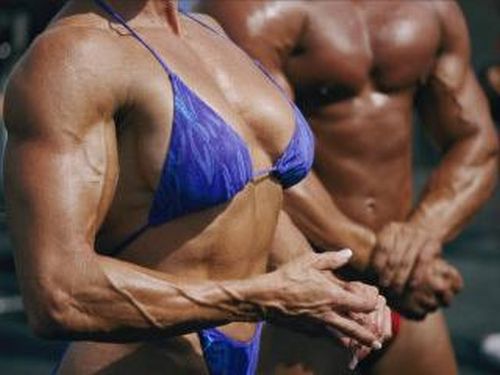
How do bodybuilders keep going on this diet of myths and contradictions?
Professional bodybuilders look great during competition, and most of them believe that their ‘ripped’ physiques are at least partially the result of their carefully planned nutritional programmes. However, new research carried out by Janet Brill at Florida International University indicates that most bodybuilders have weighted down their minds with a load of nutritional bunkum. At best, these faulty beliefs waste bodybuilders’ money; at worst, they may actually make it harder to produce the rock-hard physiques which bodybuilders desire.
After surveying 309 male and female bodybuilders, Brill discovered that the following myths about nutrition were prevalent:
Myth No. 1: Protein supplements are necessary to build muscle mass. Fact: Whenever a bodybuilder lifts a weight during a workout, carbohydrate – not protein – provides the necessary energy. Therefore, large amounts of carbohydrate are required to carry out the strenuous training needed to stimulate muscle growth. The excess dietary protein which bodybuilders consume isn’t funneled directly into muscle production; in fact, the builders’ bodies actually convert extravagant quantities of protein into carbohydrate, which is then metabolized for energy.
Myth No. 2: Carbohydrate loading just before a competition helps to ‘pump up’ muscles. Fact: When carbohydrate (glycogen) is stored inside muscle cells, water is stockpiled, too, so this belief seems logical at first glance. After all, maybe that accumulated water could make muscle fibres swell up a bit. However, if carbo-loading really produced a ‘maximum pump’ marathon runners would have gargantuan arms and legs instead of their characteristically scrawny appendages. Indeed, scientific research has shown that carbo-loading doesn’t expand muscle-cell diameters at all.
Myth No. 3: Carbohydrate loading stretches the skin, making muscles bulge. Fact: Carbo-loading doesn’t broaden the muscles, so there’s no extra pressure put on the skin. Also, carbohydrate isn’t stored in the skin, so there is no reason for the body’s outer covering to change in any way.
Myth No. 4: Consuming extra quantities of sodium increases muscle definition. Fact: The hypothesis is that the additional sodium will pull water into muscle cells, making the muscles expand, but there is absolutely no evidence that this actually happens. In fact, the extra sodium is usually simply dumped into the urine.
Myth No. 5: Sodium restriction increases muscle definition. Fact: Again, there’s no supportive evidence, but this widespread belief, the exact opposite of Myth No. 4, gives a good indication of the nutritional confusion which prevails among bodybuilders.
Myth No. 6: Bodybuilding magazines are the best source of information about sports nutrition. Fact: Bodybuilding magazines can’t survive on subscription sales alone; they need the advertising revenues which they receive from nutritional-supplement manufacturers. It’s doubtful that bodybuilding publications will ever bite the hand which feeds them; after all, contradicting the unverified nutritional claims made by supplement makers could lead to a loss of advertising.
Myth No. 7: ‘Growth-hormone releasers,’ including amino acids such as arginine and omithine, are effective alternatives to steroids for enhancing muscle growth. Fact: There’s no solid evidence that the releasers have an anabolic effect.
Not surprisingly, Brill found that only 1 per cent of bodybuilders get their nutritional information from registered dietitians. The same percentage of builders derive their dietary information from family members and friends – or from television! In contrast, about 50 per cent of all bodybuilders receive their primary nutritional advice from other bodybuilders, and 17 per cent rely on bodybuilding magazines. Overall, ‘someone who has recently won a contest is viewed as a far more credible source of nutritional information than a nutritionist or an exercise scientist,’ notes Brill.
How do bodybuilders look so great – when their nutritional beliefs are so flabby? I will have to let you use your imagination to resolve that strange paradox. *cough* STEROIDS!!! *cough*

Really like this blog, Bruno. Just came across it accidentally. You present information logically and concisely. If I didn’t live in Los Angeles, CA. I would work out with you.